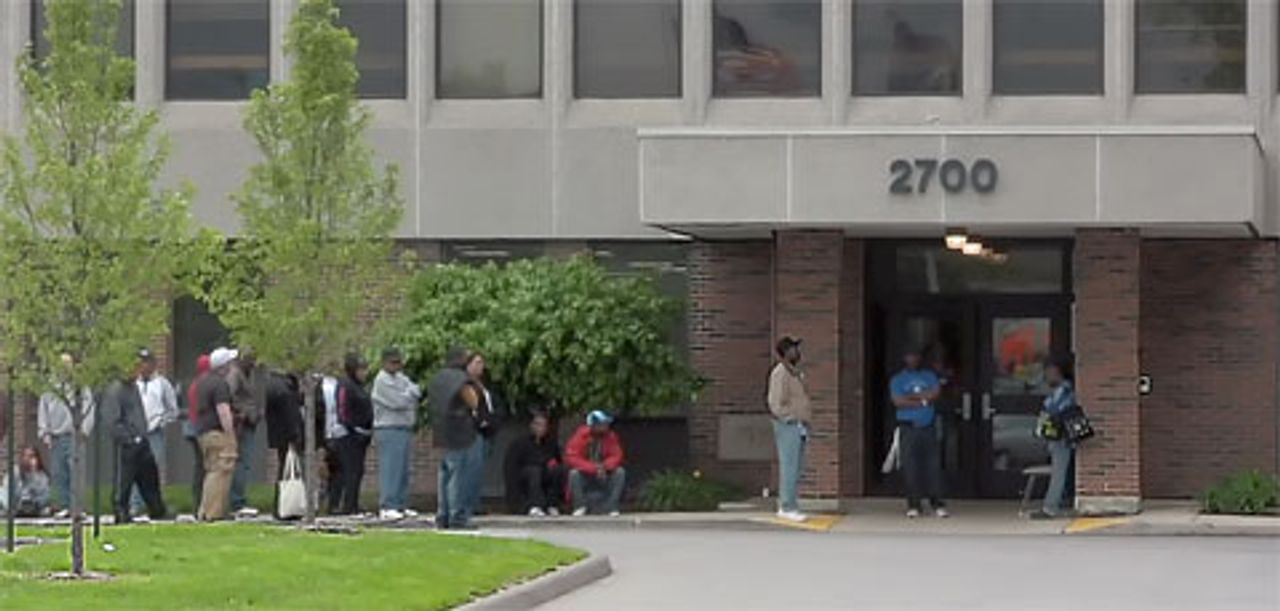The state of Michigan is implementing $304 million in emergency budget cuts ordered by Democratic Governor Jennifer Granholm as the legislature debates even deeper cuts for fiscal year 2009-2010. State workers and Medicaid recipients are among those being impacted by Granholm’s measures.
State workers are being forced to take six unpaid furlough days and, on July 1, adults on Medicaid will lose all access to dental and optical care.
 Patients line up for free dental care at the University of Detroit Mercy Dental School
Patients line up for free dental care at the University of Detroit Mercy Dental SchoolThe adult dental Medicaid program faces a $2.9 million cut. According to a letter sent to Michigan Medicaid recipients, dental and eye care services will now only be provided in an emergency. All routine dental work, cleaning, exams, fillings and dentures will not be covered. Eyeglasses, contacts and eye exams will also no longer be covered, nor will visits to podiatrists and chiropractors.
The governor has proposed additional and much deeper cuts for the upcoming fiscal year. The state now expects to collect about $1.7 billion less in revenue in fiscal 2009-2010 than originally estimated.
In February, Granholm proposed cuts totaling $670 million for fiscal year 2009-2010, to fill part of the gap that will accumulate from October 2009 through September 2010. By the end of FY 2010, 1,500 additional state workers will be laid off, according to the governor’s February budget plan. The state also plans to demand more concessions from state employees.
Even before the onset of the global economic crisis, state officials expected a structural state budget deficit. After federal stimulus money is exhausted, even deeper cuts will be needed.
K-12 school funding is to be cut by $100 million; the per-pupil foundation allowance will go down $59 per student. Funding for before and after school programs will be eliminated. A drastic $100 million in cuts to higher education funding is to be implemented.
While press coverage has focused on the proposals to lay off state police and close some state prisons, the Michigan Poverty Law Program says the 2010 budget “would harm seniors and low-income residents.” The group highlights additional cuts Granholm has proposed be incorporated in the state budget for next year, such as:
• $106 million in cuts to the Department of Community Health, including: $7.6 million reduction in funding for mental health services for individuals who do not qualify for Medicaid and reductions in mental health initiatives for older persons, the mental health court pilot projects, mental health respite services and substance abuse services. The Mt. Pleasant Center, a state hospital currently housing individuals with developmental disabilities and mental illness, will be closed.
• $2.2 million in cuts to the Office of Services to the Aging, with specific reductions in in-home services, care management, congregate meals, home delivered meals, the foster grandparent and RSVP programs, senior companions as well as other programs.
• The AIDS Risk Reduction and Media Line will be eliminated. No funding will be available for Huntington’s disease, Parkinson’s disease, osteoporosis, or arthritis, and a diabetes outreach program at Wayne State will be defunded. The Nurse Family Partnership to address the state’s infant mortality rate will be discontinued.
• Funding for the state’s poison control centers is to be eliminated. Parents of children in the Children’s Special Health Care Services Program will be required to pay increased parent participation fees.
Looking to the future, new estimates indicate devastating consequences for FY 2011. For example, school aid will have a $500 million shortfall and funding could decline by $320 per pupil in each school. Teachers and other school workers are already being lined up to pay for these cuts, with demands to reduce jobs, pay and benefits, in line with the restructuring demanded at General Motors, Chrysler and Ford.
Michigan, battered by the collapse of the auto industry, has experienced a dramatic drop in tax revenues over the past year. The state’s unemployment rate stands at nearly 13 percent, the highest in the country. Personal income taxes are down almost a quarter from last year and sales tax revenues have fallen nearly 8 percent.
The projected budget deficit for fiscal year 2009 (FY2008-2009) topped $1.3 billion, but federal stimulus money was used to plug part of the deficit. However, the state faces a projected drop of an additional $1.7 billion in revenue for (FY2009-2010), far more than originally estimated.
A further $20 million cut in childcare subsidies was averted by using Temporary Assistance to Needy Families (TANF) funds previously directed to cash assistance and other areas. TANF provides cash welfare under the Welfare to Work program that replaced cash assistance under Clinton’s sweeping federal welfare reform in 1996.
State revenue-sharing funds for local communities are being reduced again and the Department of Community Health is being cut, with $10 million slashed statewide from mental health services.
In 2006, Michigan had a monthly average of 87,800 children in low and very low income households, depending on subsidized childcare. Like many other social programs now on the chopping block, this program has been sharply curtailed over the years. In January 2008, the maximum hours for working parents to receive subsidized childcare dropped from 100 to 90 over a two-week period, down from 120 hours in the 1996 welfare-to-work reform.
The fiscal year 2008-2009 cuts come on top of $134 million in emergency cuts the governor implemented in December. The economic crisis is being used to carry out attacks on the working class long desired by big business. By forcing Chrysler and GM into bankruptcy in order to slash the wages, jobs and benefits of hundreds of thousands of workers, Obama signaled that nothing won by the working class through generations of struggle is sacred.
The refusal of the Obama administration to provide aid to California and other states such as Michigan that are facing budget implosions demonstrates the bankruptcy of the unions’ policy of supporting Obama and the Democrats in the 2008 elections. Under Washington’s new regime, unlimited funds are available for the banks and emergency appropriations for the wars in Afghanistan and Iraq, while programs on which millions of working people depend are gutted.
The cuts in Michigan come as Chrysler and General Motors prepare to cut tens of thousands of jobs over the coming months. State economists forecast Michigan unemployment reaching 14 percent this year and over 15 percent in 2010. As a stopgap, Michigan and several other high unemployment states have received temporary extensions of unemployment benefits, adding up to 33 weeks of federally subsidized unemployment compensation to the regular 26-week state benefit.
However, unemployment benefits pay just 60 percent of previous wage income. Furthermore, growing numbers of long-term unemployed have already exhausted their regular 26-week state benefits and over half of unemployed workers do not qualify for benefits, as work history criteria have been tightened over the last 20 years.
When unemployment runs out, workers face a dire situation. In 2007, welfare cash payments for single parents living in Michigan was restricted to two years in any individual’s lifetime. The monthly cash benefit for single parents has been frozen for nearly two decades as part of welfare-to-work policies mandated at the state and federal level.
In October 1991, Michigan was the first state to eliminate General Assistance, a state assistance program that provided $160 a month in cash to the long-term unemployed. In addition, medical care and Food Stamps for unemployed and childless men and women were restricted or eliminated.
The World Socialist Web Site interviewed Joseph Williams in downtown Detroit. He described the impossible conditions facing the long-term unemployed, including those forced to work part-time because they have cannot find full-time work.
 Joseph Williams
Joseph Williams“I spent 15 years working in a car wash and when I had to leave there I worked packing auto parts through a temporary agency. We were getting about $1.85 an hour—that was five years ago—and the regular workers told us they made $8 to $10 an hour. But they said that at one time the job was like working at the Big Three, with good wages and benefits. I worked there three years and I also worked in meatpacking. But when I got the flu that was the end of that job.
“My father worked in the steel division at Ford for 35 years and my parents spent their whole lives buying our home. But then my mother got ill and had to take out a second mortgage to pay the bills. I finally could not keep up the payments and lost the house.
“What really messed my life up was when they eliminated General Assistance. I was in school at the time and I had only one class left to take before I graduated. The class was economics!
“So I came down here in 1991 and I’ve been stranded here ever since. I went again to apply for unemployment benefits a week ago, but I knew they were going to turn me down. The owner of the car park where I was working had two BMW’s, but he couldn’t even pay us enough so we could qualify for unemployment benefits. That is how they do you, because they can get away with it.
“I went up to the Michigan Works! office mainly to look for a job. Boy that place was loaded with people—it was bursting at the seams. And they were people with a lot more education than me, so what chance did I have?
“When I worked at the car park people would come in and pay to park and then we found them living in their cars. They had no place to go. Now I feel lucky when I can get money for a bus pass, because that way they let you ride the bus all night so you have a place to go. I consider myself lucky to still be alive—some people just die out here.”
